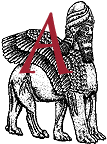 s Eric S. Rabkin suggests in The Fantastic in Literature, an emphasis upon this antithetical relation to reality continually appears in the individual work itself:
s Eric S. Rabkin suggests in The Fantastic in Literature, an emphasis upon this antithetical relation to reality continually appears in the individual work itself:
While fairy tales use the World of Enchantment as their location, and are therefore highly fantastic, a true fantasy such as Alice continues to reserve its ground rules again and again.... Fantasies may be generally distinguished from other narratives by this: the very nature of ground rules, of how we know things, on what basis we make assumptions, in short, the problem of knowing infects Fantasies at all levels, in their settings, in their methods, in their characters, in their plots. [37]
Rabkin's useful working definition of literary fantasy leads us to several points about this imaginative mode in both the visual and verbal arts. First, fantasy and our conception of what is fantastic depend upon our view of reality: what we find improbable and unexpected follows from what we find probable and likely, and the fantastic will therefore necessarily vary with the individual and the age. Many of the basic assumptions which the Middle Ages or the eighteenth century made about society, human nature, the external world and the laws that govern it appear bizarre today, while many of our century's attitudes towards body and spirit, like its technological, artistic, and political creations, would appear as pure fantasy to earlier times. Air travel, telecommunications, lasers, and creation of new elements were found only in the realms of magic and faerie but a short time ago. Nonetheless, obsolete ideas of reality in earlier works of painting and literature do not, by themselves, create in us today a sense of the fantastic; a second element is required. Something, whether the reactions of a character within a literary work or some other device, must signal us that we are to take certain elements as fantastic. Whereas literature possesses several such devices, they are far harder to employ in painting and book illustration- a fact which creates problems and fascinations for the student of fantasy in the visual arts. One does not, for example, perceive as fantastic a sacra conversazione because it contains saints who lived in different ages, just as one does not take as bizarre floating human figures whom we perceive to be angels, emblems of fame, or the Virgin Mary rising to heaven.
Related Material
References
Landow, George P. "And the World Became Strange: Realms of Literary Fantasy", The Georgia Review 33: 1 (Spring 1979).
Rabkin quoted from his The Fantastic in Literature. Princeton: Princeton Univ. Press, 1976. 37.
Last modified 1996